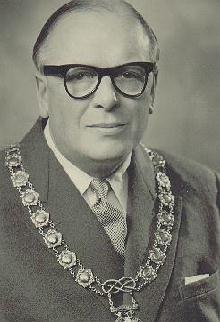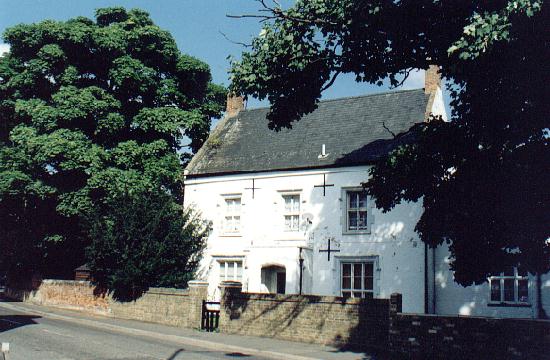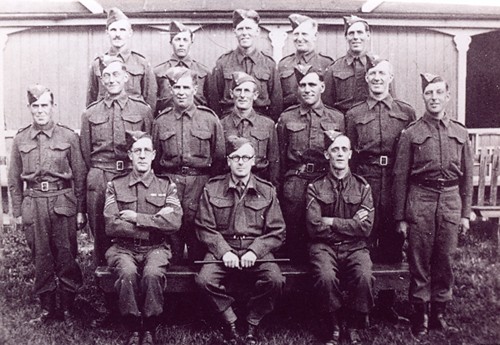|
 |
Dr
George
Holloway
1905-1967
|
A family doctor with a genial personality and a wide
involvement in the community and its administration made Dr George Holloway a
prominent character in the life of Bourne during the middle years of the 20th century. He had a reputation as a wit and raconteur and was an impressive mimic, as befitting the
half-brother of the actor and comedian Stanley Holloway [they both had the
same father], and he usually dominated the company he was in with his forthright views,
blunt speaking and good humour.
Dr George Augustus Frank Holloway was born in London on 23rd December 1905 where his step-father was in general practice. On leaving school, he also studied medicine and after qualifying, became a general practitioner at Loughton, Essex, before moving to Bourne in 1938 to take over the practice at Brook Lodge in South Street, then run by Dr William Monteith. He arrived in the town having already been made a Freeman of the City of London and a Liveryman of the Society of Apothecaries, one of the capital's distinguished livery companies, two unusual achievements at an early age of which he was exceptionally proud for the rest of his life.

Brook Lodge was built as the vicarage for Bourne in 1776 by the Rev Humphrey Hyde who was the incumbent at the Abbey Church from 1763 until 1807, and stands at the end of Church Walk but the frontage is on a bend in South Street. It was replaced by a new vicarage in 1879 and
then became Dr John Gilpin's surgery. There was a tiny lean-to at the back of the house that was used as a waiting room and the surgery times were posted by the door over the message box where medicines and prescriptions were put out for collection. The practice later moved to the new health clinic when it opened in St Gilbert's Road in 1971 and thence on to the Hereward
Medical Centre in 1998. The house is now converted into flats.
Before Dr Holloway arrived in Bourne, he had joined the Territorial Army in London as a doctor but this patriotic act eventually proved to be detrimental to his professional career because he had hardly become established in Bourne when he was among the first to be called up for military service after the Munich crisis of September 1938, the policy of appeasement by the Prime Minister Neville Chamberlain which lead to the outbreak of the Second World War a year later. His war service with the Royal Army Medical Corps began with an attachment to the anti-aircraft defence units around London and soon after war was declared on 3rd September 1939, he was sent to join the 5th Battalion Northamptonshire Regiment serving in Europe, taking part in the retreat from Brussels and the subsequent evacuation of Allied troops from the beaches of Dunkirk in the early summer of 1940.
Shortly afterwards, Dr Holloway was invalided out of the army with shell shock and resumed his practice in Bourne, only to find that the bulk of his patients had gone to Dr John Galletly in North Road who had also been given most of the local authority appointments
when he and his sister, Dr Ruth Finn, remained the only doctors in the
town. He was so angered by the situation that had been created by his absence
on active service that he and Dr Galletly never became close friends and although a working relationship continued and they stood in for each other during holiday periods, there was a coolness between them whenever they met.
Despite these setbacks, Dr Holloway soon built up a busy practice and secured several public appointments, serving for three years as an assistant medical officer and school medical officer to Kesteven County Council and as medical officer to the Bourne division of the St John's Ambulance Brigade. But local government became
a passion, serving two spells as one of the Bourne members on Kesteven County Council and in 1951, he was elected to Bourne Urban District Council, becoming chairman in 1957-58 and as a former chairman of the county public health committee, was a guiding hand with the extensive re-sewering of Bourne and much-needed extensions to the town's sewage disposal works.
His other main interest was in his work as a magistrate, sitting on the
Bourne bench of justices from 1960, and he often said that it was his
father who wanted him to become a doctor and that as a young man he would
rather have studied law and become an advocate.
Other public duties included membership of the Kesteven Executive Health Council, the South Lincolnshire Water Board, Bourne United Charities and as a governor of Bourne Grammar School.
He was also actively associated with the Bourne branch of the Royal British Legion and the Hereward Lodge of Freemasons of which he was a past master. He also had a passion for sport, becoming president of the Lincolnshire Rugby Football Union and vice-president of Bourne Cricket Club.
His health in later years began to decline and in 1962, he took a back seat in his council duties because of pressure of work but returned with his full vigour two years later and subsequently made only the minimum concession to his illness. Nevertheless, he knew that he did not have long to serve on Bourne Urban District Council and actually named the successor for his seat, Mrs Marjorie Clark, then landlady of the Nag's Head where he was a frequent customer. He and
Mrs Clark regularly discussed local issues whenever he dropped in and one evening late in 1966, with the council elections pending the following spring, he appeared in the lounge as usual but as he left to go home, he put his head round the door and said: "I am dying and will be unable to carry on and so I want you to take my place when it happens."
He did not seek re-election because of his ill health and so Mrs Clark took his place at the hustings and in 1967 was returned unopposed to fill the seat he had vacated.
During Dr Holloway's illness, the bells of the Abbey Church
nearby were silenced over the Christmas period in 1966 on the orders of
the vicar, Canon Hugh Laurance, who knew that he disliked them, calling
them "Heavenly music". He died at Brook Lodge from a heart attack on Tuesday 10th January 1967, aged 61,
leaving a widow,
Mrs Gladys Holloway, formerly a singer with the D'Oyle Carte Opera
Company, and three daughters, two from his previous marriage, his first wife having died shortly before he moved to Bourne. The funeral service was held at the Abbey Church attended by over 400 people. In a short tribute, Canon Laurence, said:
Dr Holloway was held in high esteem and affection, having made his mark on so many aspects of the life in the town and county that probably no one person could be adequate for the task of paying a proper tribute. Wherever he went and whatever he did, his rugged personality made itself felt. He wasted little time on non-essentials and went straight to the heart of a matter in a way which won the confidence of his patients and the respect of those with whom he worked on board or committee. His kind are not easily replaced and his death leaves our town and district immeasurably the poorer. It is out of our own deep sense of loss that we extend our sympathy to his wife and daughters. For a man who always said he had no bedside manner, the respect and love of his patients was the greatest testimony to the worth of the life he lived. The words of one of them best sums up all we would like to say: "We have lost not only a doctor but a friend."
News of Dr Holloway's death reached Bourne Urban District Council shortly before their meeting on January 10th
when members stood in silent tribute before their business began. There were similar
acknowledgements at later meetings of the Kesteven Executive Health Council in Grantham and at Bourne Magistrates' Court the following Thursday. The chairman of the bench, the Hon Mrs A I Fane, said that Dr Holloway had been a magistrate for six years during which time his interest and advice, and particularly his medical knowledge, had been invaluable. Representatives of the police, the legal profession, the court staff and probation services, all wished to be associated with the chairman's remarks.
There is no memorial to Dr Holloway in Bourne and no tombstone in the town cemetery because he was cremated at Marholm Crematorium, near Peterborough, after the funeral and his ashes were not preserved. But in February
2003, one of his daughters, Mrs Barbara Higglesden of Kingsway, Bourne, submitted his name to be included on the newly restored wheel at the early 19th century Baldock's Mill, the Heritage Centre, along with others who wish to be so remembered. She said: "There is nothing in the town to remind people of his work other than the memories of those who knew him and still talk about him 36 years after his death. The wheel is also not far from his old home on the corner in South Road that was nicknamed Holloway's Corner after him."
Then in the spring of 2004, on the
recommendation of Bourne Town Council, one of the streets on the new
residential development at the old hospital site in South Street was named
Holloway Avenue in his memory.
|
 |
|
Despite being
invalided out of the army in 1940, Dr Holloway joined the 4th
Battalion, the Lincolnshire Regiment, Home Guard, based in Bourne,
as Medical Officer with the rank of captain and served until 1945.
He is pictured here (front row centre) with some of the men outside
the cricket pavilion at the Abbey Lawn in 1943. |
See also Dr
John Gilpin Dr John
Galletly Dr Michael
McGregor
Mrs Marjorie
Clark

Go to:
Main Index Villages
Index
|


